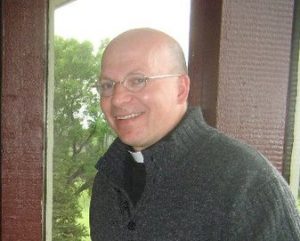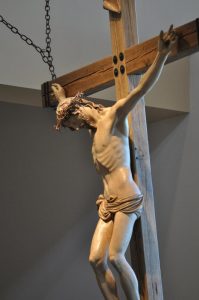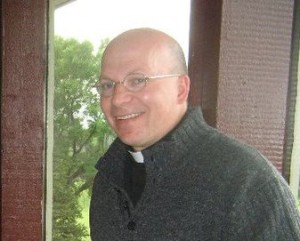Our blog series continues. We’ve now heard from Fr. Bob and several contributors on the four sections of the Catechism of the Catholic Church: “what we believe,” “how we worship,” “how we live,” and “how we pray.” Each week, we will focus on one of these sections — either with a personal witness story or some perspectives on a particular teaching. We continue on this path with some thoughts from Les Stahl, music director, St. Anne, on “what we believe” regarding divine providence. According to the CCC, #302, “God carries out his plan through divine providence…guiding his creation toward perfection.” Les is a professional composer and musician with a rich history in leading productions, liturgical music and worship programs.
 “I Believe in God, the Father almighty, maker of heaven and earth.”
“I Believe in God, the Father almighty, maker of heaven and earth.”
Oh boy, here we go. We casually say these words every Sunday, and it’s easy to just let the words fall out of our mouths as simple memorized recitation. But it is a powerful phrase, packed with more meaning than our casual Sunday brush with it might allow. And one worth unpacking.
The new IPhone has a digital assistant known as “Siri.” You’ve seen the commercials: you can ask your phone anything and it responds with an answer. “Where can I find a good pizza?” and it comes back with a list of restaurants in your area. “How do I get home?” and directions with a map immediately appear on your phone. I asked it “What is the meaning of life?” Depending on “her” mood she comes back with several answers: “To think about questions like this.” (a tip of the hat to Descartes). “I find  it odd that you would ask this of an inanimate object.” “I give up.” (probably the safest answer).
it odd that you would ask this of an inanimate object.” “I give up.” (probably the safest answer).
To the question “Who is the Creator?” Siri responded with “God is the eternal being that created and preserves the universe.” Okay now we are getting somewhere. What is meant by preserving the universe?” Answer: “Creation has to do with the origin of things while preservation has to do with their continuance. The Bible says that the same God created the universe in the beginning is presently preserving it.” Okay, simple enough.
Catholics call this Divine Providence (Catechism of the Catholic Church, 302). Although creation has its own perfection, it did not spring forth complete from the hands of the Creator. The universe was created “in a state of journeying” (in statu viae) toward an ultimate perfection yet to be attained, to which God has destined it. We call “divine providence” the means by which God guides his creation toward this perfection.
The witness of Scripture makes it clear that God cares for all, from the least things to the great events of the world and its history. Jesus asks for childlike abandonment to the providence of our heavenly Father who takes care of his children’s smallest needs: “Therefore do not be anxious, saying, ‘What shall we eat?’ or ‘What shall we drink?’. . . Your heavenly Father knows that you need them all. But seek first his kingdom and
his righteousness, and all these things shall be yours as well.” God has a
plan for creation and is working it out.
But here is the hard part: God grants his creatures not only their existence, but also the dignity of acting on their own, of co-operating in the accomplishment of his plan. This is where human failings enter into the equation.
One other phrase we casually recite by rote every Sunday in the Lord’s Prayer: “Thy will be done.” That is the meaning of life. Our faith is based on the principle of living a life in consonance with God’s plan. We are invited to be a part of God’s plan by surrendering to it rather than assuming we are the center of the universe, not God. God uses our cooperation. In his goodness, God gives us our free will and the opportunity to cooperate in his plan. Our lives are to be lived in abandonment to divine providence.
We hear the stories of saints and think: “All well and good for them, but I can’t possibly be as holy, selfless, humble, _______ (fill in the blank).” And as for all those folk in the Bible, set before us as examples, there is no way I can live up to their lives. But it’s not their journey that God wants for us; it’s our journey that matters. “We know that in
everything God works for good for those who love him.” The constant witness of the saints confirms this truth. If our lives are a constant commitment to “the journey” we are in sync with God’s plans for us. As we are his creatures, we are graced with God’s perfect love that teaches us the way home to Him. His only desire is for his beloved children to be reunited with Him in the Kingdom of Heaven. Hebrews 12, verse 1 and 2: “Therefore, since we are surrounded by so great a cloud of witnesses, let us rid ourselves of every burden and sin that clings to us and persevere in running the race that lies before us while keeping our eyes fixed on Jesus, the leader and perfecter of faith.”
 There is a saying: “Let Go, Let God.” For us the letting go that we most need to do is a type of surrender. We try to keep a tight grip on things that are out of our control. This is like trying to grip the water flowing in a river. Put your hands into the river. If you try to get the water by grabbing it and clenching your fists, it goes right out of your hands. If
There is a saying: “Let Go, Let God.” For us the letting go that we most need to do is a type of surrender. We try to keep a tight grip on things that are out of our control. This is like trying to grip the water flowing in a river. Put your hands into the river. If you try to get the water by grabbing it and clenching your fists, it goes right out of your hands. If
you relax and open, gently cupping your hands, the water flows into your palms. By relaxing, opening, and trusting, we can hold onto more of what is precious to us. By letting go, we open ourselves to becoming in sync with divine providence, God’s plan for us.
No one gets to the heart of the mystery of life, or has the key which will unlock all the doors of divine providence, unless we work to live our lives as part of God’s plan. Without that realization, life is an unsolvable riddle.
Back to Siri: “Do you have all the answers?” She irreverently answered: “A fine question. Now can we get back to work?” No one has all the answers, but we can work on it.






 I remember once hearing the phrase ‘presence is truth’. I’m not sure who said it, or what the context was, but the words rang true. They express the simple fact that if I truly care about someone or something, then I will make the effort and take the trouble to be present when they need me. John Paul II was fond of saying that the modern world does not need more empty words. Talk is cheap. What the world truly needs is people who give authentic witness of their faith, people who really LIVE the faith, people who ‘put their money where their mouth is’.
I remember once hearing the phrase ‘presence is truth’. I’m not sure who said it, or what the context was, but the words rang true. They express the simple fact that if I truly care about someone or something, then I will make the effort and take the trouble to be present when they need me. John Paul II was fond of saying that the modern world does not need more empty words. Talk is cheap. What the world truly needs is people who give authentic witness of their faith, people who really LIVE the faith, people who ‘put their money where their mouth is’.